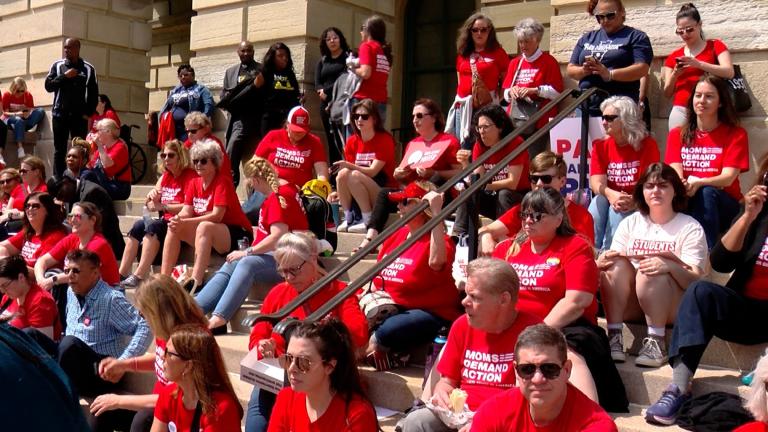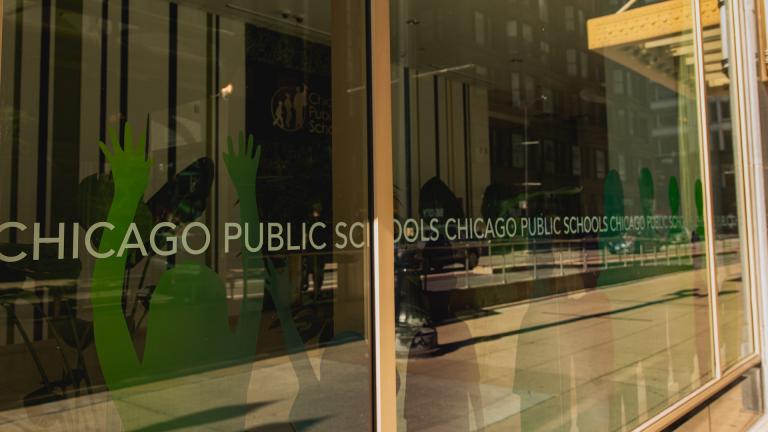Gov. J.B. Pritzker and the four legislative leaders are beginning to discuss how to address Illinois’ fiscal challenges, particularly in light of the failed constitutional amendment to overhaul how the state taxes income.
During the Nov. 3 election, voters rejected the so-called “fair tax” amendment that would’ve allowed the state to charge higher rates on those in higher income brackets and lower rates for lower-income filers.
Democrats’ budget plans had counting on that passing, and leading to $3 billion in annual revenue through higher taxes on the wealthy.
Wherever the discussions among Pritzker, House Speaker Michael Madigan, Senate President Don Harmon, House GOP Leader Jim Durkin and Senate Republican Leader Bill Brady lead Thursday’s scheduled meeting, there won’t be immediate action.
Earlier this week, Madigan and Harmon announced that the veto session set to begin Nov. 17 is canceled on account of a surge in coronavirus cases, including in the capital city.
“The front page in today’s Springfield paper warns of a COVID ‘tsunami’ sweeping the region and its health care system,” Harmon said in a statement Tuesday evening. “This is not the time to physically bring together hundreds of people from all around the state. Given what’s happening, it was an obvious decision. It’s not safe or responsible to have a legislative session under these circumstances.”
State Sen. Kim Lightford, D-Maywood, said she’s on board with the call to cancel the veto session.
“There’s stay at home for a reason. We shouldn’t be an exception to that rule,” Lightford, who chairs the Illinois Legislative Black Caucus, said. “I don’t care to be very sick and have COVID, I don’t want to bring that back to my family.”
But the delay also means the Black Caucus can’t fulfill its promise using the veto session to pass laws aimed at eliminating systemic racism.
Black legislators had wanted to capitalize on the attention and energy following George Floyd’s death, and act before the movement and the moment passed.
Lightford says she was briefly worried about the delay, but now believes the demand for change isn’t going anywhere, and that the session delay may help by giving the Black Caucus additional time to draft bills, and to get other legislators on board.
“When I saw the passion and the compassion of all walks of life, from different nationalities, religions and different age groups, it was very inspiring to me,” she said. “And I figured right then there’s no way this movement is just going to die. People really want to see democracy at its best, they want change to happen.”
With a limited session in 2020 due to the pandemic, there were only a handful of bills that made it to Pritzker’s desk; none were vetoed, so there aren’t any rejected bills for the General Assembly to take up.
But the lack of session means other important issues are also on the backburner, including energy policy, ethics and the budget.
With the failure in the election of the constitutional amendment that would have induced higher taxes on the wealthy, there's now a bigger budget hole to fill; that was projected to bring in about $3 billion annually.
The state is also still waiting and hoping for the federal government to come through with COVID-19 aid.
“The overall general revenue fund budget in the state of Illinois is about $42 billion for the current fiscal year, so $6 billion, which is both those components, that’s 14%. That’s big,” said Sen. Heather Steans of Chicago, one of Democrats’ budget experts. “If you look at $3 billon for an overall annualized year, you’re talking 7% of the budget. That’s significant.”
Steans said additional borrowing from the federal Municipal Liquidity Fund, a program created early in the coronavirus pandemic by the U.S. government for public entities that need a line of credit is an option, but it’s a last resort.
Cuts are another option.
But Steans said that too is complicated: Illinois is trying to invest more in education, which is one of the state’s top line items.
Another major expense is Medicaid, the government’s health coverage plan for low-income individuals.
“And in the middle of a pandemic, to think: Do we really want to hold back spending for health care for the poor, particularly since we’ve seen those are the communities that have been so disproportionally hurt by COVID,” Steans said. “Then, of course, you have pensions, which the Supreme Court in Illinois has said we really can’t touch. So it makes it very challenging.”
That leaves areas like social services and the prison system as areas for trimming spending, she said.
“Post-George Floyd there’s probably, I’m hoping, some look at reexamining how much we are spending in the correctional system, and some opportunities to do some reallocations there,” Steans said.
Republican Rep. Mark Batinick of Plainfield says given the gravity of the budget, it's absurd the legislature hasn't met since May.
Other governmental bodies are meeting, he said. Congress has convened and so have some Illinois legislative committees, like one he's physically attending next week in Springfield.
Batinick also says legislators should be playing more of an active role in dealing with the pandemic.
“The people deserve more input. We represent over 100,000 people each. We have ideas that can make things better,” Batinick said. “I was the first state official to call for the use of face masks. Maybe … there are other states that are doing other things to fight this. Instead of locking down, they’re being harsher on the use of face masks.”
Batinick also said he doubts that the rise in COVID-19 cases was the only reason behind the last-minute veto session cancelation.
He suspects Madigan didn’t want to bring House Democrats to the statehouse, because that could hinder ongoing efforts by the speaker – weakened due to his ties to the Commonwealth Edison bribery scheme – to secure another term as the leader of the Illinois House.
The speaker has denied knowledge of the bribery plot, and said that he has done nothing improper.
But at least eight House Democrats have publicly said they will not vote for Madigan again as speaker, and other Democratic legislators have enough doubts about his status that they are thus far unwilling to commit either way.
“If (Madigan) had 60 votes, we would go down. There’d be nuclear fallout in Springfield, and we’d be going there in Hazmat suits so he could take the vote and get it guaranteed,” Batinick said.
In a note to members, Madigan’s office said that there would be no veto session because “there is a strong majority of members who would prefer the House delay convening to a later date; this is primarily motivated by concerns about the rising COVID-19 rates and proximity to upcoming holidays.”
Regardless, Sen. Rob Martwick, who has a heart condition that requires he be particularly cautious, says there should be a digital alternative to going to Springfield.
“The people of Illinois elected us to go to work. We cannot continue to defer our work again in the hopes that the pandemic will go away. We need to get back to work and we need to do our work, and there really is no reason in the 21st century that we cannot enact some sort of permission for a virtual session,” he said.
During its brief spring session in May, Martwick introduced legislation that would have allowed just that, but it narrowly failed in the House.
For Martwick, no veto session is a missed opportunity to advance a bill that would make Chicago’s school board an elected body.
While the General Assembly will not meet again in 2020, there are rumblings of a so-called “lame duck” session early in 2021, before the new crop of legislators begin their work Jan. 13.
Follow Amanda Vinicky on Twitter: @AmandaVinicky








